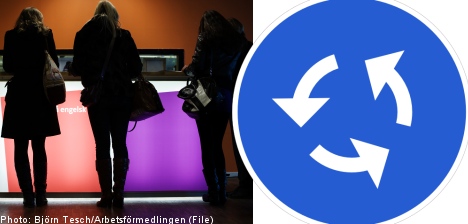Whatever the circumstances, at some time or other many of us are likely to lose our job, and more often than not it will probably be a traumatic experience.
The good news, however, is that if you happen to live in Sweden, there is less cause for immediate panic than there would be if you found yourself in many other countries, including, possibly, the one you have left to come to Sweden in the first place.
The reasons for losing your job can be many, but in Sweden, one of the more common explanations for redundancies is a lack of business, (arbetsbrist), in short, a cost cutting or restructuring measure.
The terms may be different but the result will probably still feel unjust.
Sweden also has a much stricter policy when it comes to letting staff go, and the “last in first out” tradition still holds very strong in many industries, though by no means all.
The upshot can be that, even if you’ve been busting your tail for the past year, while the guy at the desk next to you has been spending his days sipping coffee in the break room, the fact that he’s been with the company longer than you means that you, rather than your lazy colleague, will get the axe.
Of course, if you feel you have been treated unfairly you need to get legal advice as soon as possible. If you are a union member your first port of call should be your local rep who will inform you of your rights, but it is worth getting clued up on the subject anyway, whether you are in a union or not.
Thankfully, the state provides a pretty sturdy safety net for those who need it after they’ve been handed their pink slips.
As Sweden is such an English-language friendly country, there is also plenty of written advice available that non-Swedish speakers can get their heads around.
Hopefully if you have lost your job, your most critical decision has been made previously – to pay into an unemployment insurance fund (a-kassa).
“A-kassa” should be one of the first words you learn when embarking on a career in Sweden.
There aren’t too many expats who will not find themselves out of work at some point during their sojourn in Sweden, and paying monthly premiums means you will have a buffer against a complete loss of income should you lose your job.
Although historically most of these funds have been tied to trade unions, since 2007, it has been possible to pay into a scheme without union membership.
For a full list of current funds, both unionised and non-unionised, go to www.a-kassa.nu/a-kassor-i-sverige.
Whether you have been paying in or not, your first point of call on your first day of unemployment is the Swedish Public Employment Service (Arbetsförmedlingen), where you will have to register as unemployed and sign up for your individual “back to work” plan.
“It is imperative you do this in person on the first day of your unemployment,” says the agency’s Fredrik Muller.
“You can fill in the paperwork online in advance of your visit to speed up the process, but you will not be eligible for benefits until you have presented yourself at the nearest office”.
With this in mind he also advises bringing copies of relevant paperwork, such as educational qualifications and proof of your work experience.
“Even if you have received a severance payment of a certain number of months, it is still best to come in and register as soon as possible, as it may have a bearing on things such as sickness pay, parental leave, and other benefits,” adds Muller.
While the bureaucracy of these places can be maddening, you will, if you are patient and not averse to form filling, get a great deal of advice about what you are entitled to and for how long.
The rules are long and complex, and bound by numerous conditions depending on how long you have been working and your own specific situation regarding geography, health, etc.
The conditions for entitlement to unemployment insurance are based on many conditions, the first of which being the assumption that the applicant is actively seeking employment, and applies to all those working in Sweden or who live in Sweden and work cross-border in another EU or EES country.
There are two forms of benefit available, basic or income-related. The first is a fixed payment for those who meet the basic conditions and work requirement, but who have not yet joined an unemployment insurance fund or who haven’t been a member long enough.
How much you receive will depend on your previous job (if any), the number of days you have worked over a stipulated period, and payments you have made before. This will range from 320 to 680 kronor ($50 to $108) per day.
There are also procedures in place if you feel the need to appeal over the amount you are to be paid.
Muller’s final piece of advice is worth bearing in mind.
“Don’t delay looking for a new job. If you are still in your notice period, start then, because the recruitment process can be very long in Sweden, especially if you are applying for several jobs at once,” he explains.
The next task, of course, is to go about finding a new job.
While by no means a panacea when to comes to landing your next job, the Employment Service can nevertheless be quite helpful in letting you know what grants may be available and offering practical advice on another of matters related to your search, as well as tips about starting your own company.
Naturally, they do have a vacancy list online divided by profession and location, and if your Swedish is not yet up to scratch for job hunting, you can search for jobs in English.
There are also a number of other website with job listings, including www.monster.se, www.jobbsafari.se, and www.stepstone.se.
The Local’s own job listsings (www.thelocal.se/jobs) can also be a great resource.
Finally, if you are new to being unemployed and feel that you need extra guidance, the Employment Service also offers coaching services, although just how useful they are is open to debate.
If you are a professional and have already worked in Sweden for a while, you will probably already know most of the relevant publications and websites specific to your own field, which is an obvious starting point.
Another option may be to employ the services of a career coach.
Like in many other countries, career coaching is a growing field in Sweden, and some of the larger ones have tailor-made programmes of varying length and depth, which can involve personality tests, mock interviews, and help in the physical job search for what will be a new experience for many in Sweden.
So, while losing your job can no doubt be a difficult and unwelcome experience, try to look on the bright side and remember that Sweden is probably one of the best places to be when facing the prospect of unemployment.



 Please whitelist us to continue reading.
Please whitelist us to continue reading.
Member comments